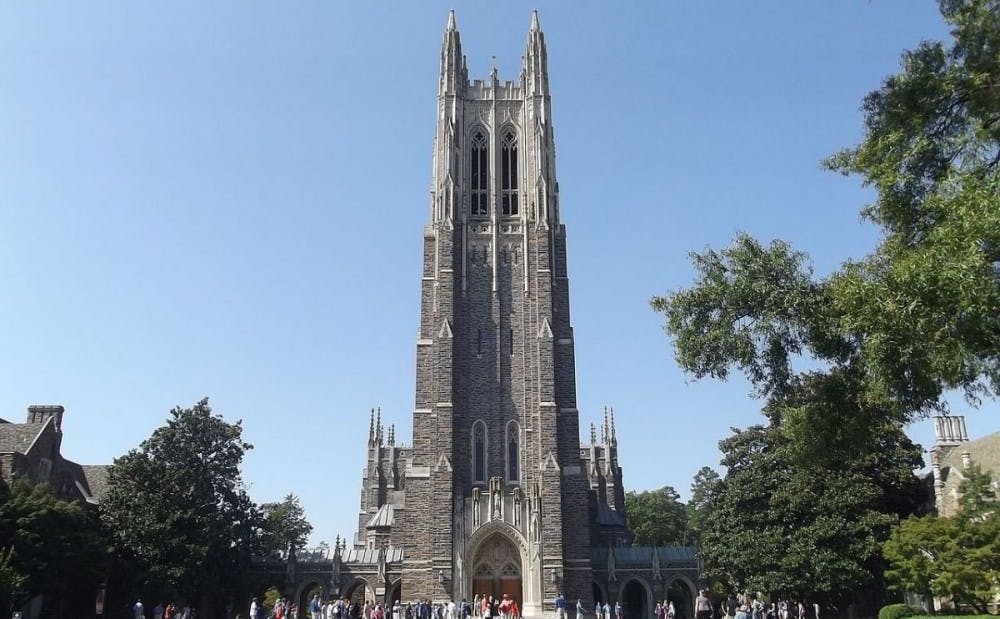Duke is full of people who have an exaggerated sense of self-importance. Sometimes it seems like they have bought into the belief that they are the greatest thing since the sliced bread, or maybe even the quesadilla from Sazón. They believe that they are wealthy, accomplished or successful because they deserve it.
I hate to be the bearer of bad news, but most Duke students are not nearly as self-made as they’d like to think. We are wealthy, accomplished and successful largely because of a complex set of factors in place before we were even conceived.
Let’s look through the lens of current Duke students and see what we have in common. One statistic that you’ll notice about us, by reading any demographics sheet about any graduating or incoming class, is that most of our parents were wealthy. Our classes are made up of students whose parents are consistently rich. Or upper class. Or affluent. But certainly not, as we like to call ourselves, “upper-middle class.” Pew’s definition of middle class includes incomes from roughly $45,000 to $135,000, which represents incomes from two-thirds to two times the median in the United States. While cost of living certainly affects whether or not you are middle class, if your parents are bringing in $150,000-200,000 a year, you’re much more “upper” than you are “upper-middle” class.
Now, you could say that perhaps wealthy students just work harder or take their studies more seriously. Generally speaking, you may be correct. But regardless, hard work and studying are learned behaviors. You probably learned that school was important from your wealthy parents, or your uncle Dan with a law degree from Princeton. You saw them become successful through academics, so you knew you could too. The extracurricular opportunities and rigorous school curriculum you grew up with probably didn’t hurt your chances at Duke either.
We can’t forget athletes, either. As much as we all love Zion and Jack White, there is doubtless some 5’5” guard that put in way more hours at the gym but could never play for Duke because of his height, or many more who inherited weak ankle joints that twist every time they play basketball (thanks, Mom)!
If your metric of meritocracy is hard work, then a poor, first-generation kid from an underachieving school that scores a 1400 on the SAT deserves to be here way more than a rich legacy that got a 1530. That tiny guard deserves to be here more than our man Cameron Reddish. Meritocracy and “anyone can do anything!” mindsets never take context into account, and neither do we when we think of how we got into Duke. It’s like comparing the height of the plants growing through the cracks in the sidewalk to trees constantly sprayed with Miracle-Gro™; and saying that the sidewalk plant should have just tried harder.
Just like little plants, we don’t get to choose who gives birth to us or what school district we are funneled into. We don’t get to choose the rates of incarceration in our neighborhood, or whether or not our high-school boasts the best lacrosse team in the state. We do not choose how tall we will grow or how much guidance and help our community gives to us.
It is a hard fact to accept, but more than anything else, our successes are the result of chance. They are not due to our own inherent superiority to others or because we are deserving of what we get. If coming to Duke, or, more broadly, achieving success, is making it to the end of a hidden path in the forest, some of us have been lucky enough that others have cleared a nice neat path in front of us and given us some really good guidance on where the path should be. Others blundered our way through the briar patch and happened to find ourselves here.
If you can humor me for a second and believe—at least a little bit—that we are not so much the sole heroes of our Duke acceptances but smaller players in a chess game that we didn’t set up, then perhaps you are ready for an even more radical idea.
As much as we alone are not to be credited for our successes, people in bad situations are rarely solely to blame for what happens to them. The average man who receives a prison sentence for selling heroin may have been born in a poorer part of town to parents that didn’t have as much money or time for him. Growing up, he may have been influenced by older, law-breaking friends and a lack of after-school opportunities in his district. A million other factors led him down that road, and you down another. Situations are rarely as simple, and outcomes are rarely as fitting, as we like to think them to be.
In my mind, the questions “Who deserves to get into Duke University?” and “Who deserves to get busted for dealing heroin?” have the same answer: pretty much no one. You could easily have been born into a cycle of addiction and poverty, but instead you are here. You probably don’t deserve it, but you better take advantage of and appreciate this crazy opportunity that is Duke University.
Luke Sallmen is a Trinity sophomore. His column usually runs on alternate Thursdays.
Get The Chronicle straight to your inbox
Signup for our weekly newsletter. Cancel at any time.

